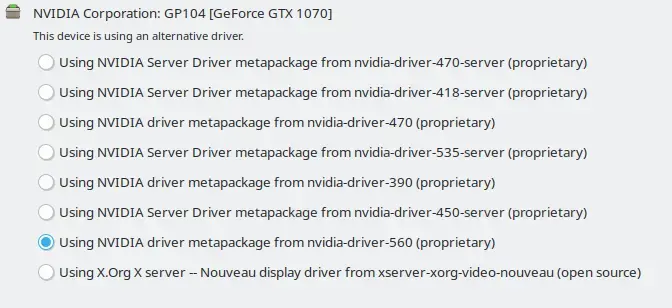54
Pop!_OS crashes on suspend after updating to Nvidia 560 drivers.
(lemmy.dbzer0.com)
From Wikipedia, the free encyclopedia
Linux is a family of open source Unix-like operating systems based on the Linux kernel, an operating system kernel first released on September 17, 1991 by Linus Torvalds. Linux is typically packaged in a Linux distribution (or distro for short).
Distributions include the Linux kernel and supporting system software and libraries, many of which are provided by the GNU Project. Many Linux distributions use the word "Linux" in their name, but the Free Software Foundation uses the name GNU/Linux to emphasize the importance of GNU software, causing some controversy.
Community icon by Alpár-Etele Méder, licensed under CC BY 3.0
Have the same gpu and had same issue give me a second to find the solution again.
Now back at PC:
Right so i searched for a while back when i got those issues and the only solution that really worked for me was installing 550 instead. Idk how PopOS / ubuntu does things. So doing this could be easy or super fucking annoying.
depending on the repo you are using for the nvidia driver, you might be able to specify the driver version during install like so:
sudo apt install nvidia-driver-550I am on debian12 and installing from repo didnt work for me as there were lots of dependencies that had version conflicts. I ended up installing it with the .run file which is really tedious.
Im gonna be honest tho the chance that this will fix your issue is not that high. Nvidia problems are so fucking diverse and could be due to any number of specific system component and package combinations. But if its already broken, might as well try right?
So after installing it I see:
nvidia-driver-550 is already the newest version (560.35.03-1pop0~1729800494~22.04~4a3cad6)So 550 is there, but it's using 560. I assume that means I need to purge all traces of 560 and 550 and then reinstall 550, unless I can specify somewhere to use 550.
However in software and updates there is no 550, only 560.
Have you tried 535 yet? I would do that before trying to experiment with other installation pathways.
Alright, I think I may have found my solution.
So it's a workaround. It's essentially finding a way to make the "new" stuff feel like the old stuff, but as an added benefit, I get all the functionality that the new stuff offers.